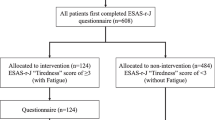Abstract
Background and Objectives
Although some studies have examined the use of corticosteroids, their effectiveness in treating cancer-related fatigue (CRF) has yet to be established. Therefore, this retrospective study attempted to identify factors that would predict the usefulness of corticosteroids in treating CRF.
Methods
We examined 87 hospitalized end-of-life cancer patients who were given betamethasone for relief of CRF at our hospital between January 2008 and January 2014. We evaluated the effect of betamethasone at 3 days after administration and performed a multivariate logistic regression analysis designed to identify predictive factors for the usefulness of corticosteroids. Threshold measurements were examined using a receiver operating characteristic (ROC) curve.
Results
This analysis identified the initial daily dose of betamethasone [odds ratio (OR) = 1.662], days from the start date of betamethasone administration to the date of death (OR = 1.05), administration of fentanyl (OR = 0.206) and age (OR = 1.055) as significant factors related to the effect of betamethasone. ROC curve analysis of the effect of the betamethasone showed that the threshold for the initial daily dose of betamethasone was above 4 mg, the threshold for the days from the start date of the betamethasone administration to the date of death was above 16 days and the threshold for age was above 60 years old.
Conclusion
The initial daily dose of betamethasone, days from the start date of the betamethasone administration to the date of death, non-administration of fentanyl and advanced age were shown to be predictive factors for the usefulness of corticosteroids for CRF in end-of-life patients.
Similar content being viewed by others
References
Mücke M, Mochamat, Cuhls H, Peuckmann-Post V, Minton O, Stone P, Radbruch L. Pharmacological treatments for fatigue associated with palliative care. Cochrane Database Syst Rev. 2015;5:CD006788.
Yennurajalingam S, Bruera E. Review of clinical trials of pharmacologic interventions for cancer-related fatigue: focus on psychostimulants and steroids. Cancer J. 2014;20:319–24.
Lundström S, Fürst CJ, Friedrichsen M, Strang P. The existential impact of starting corticosteroid treatment as symptom control in advanced metastatic cancer. Palliat Med. 2009;23:165–70.
Lundström SH, Fürst CJ. The use of corticosteroids in Swedish palliative care. Acta Oncol. 2006;45:430–7.
Gannon C, McNamara P. A retrospective observation of corticosteroid use at the end of life in a hospice. J Pain Symptom Manag. 2002;24:328–34.
Mercadante S, Fulfaro F, Casuccio A. The use of corticosteroids in home palliative care. Support Care Cancer. 2001;9:386–9.
Shih A, Jackson KC. Role of corticosteroids in palliative care. J Pain Palliat Care Pharmacother. 2007;21:69–76.
Hardy JR, Rees E, Ling J, Burman R, Feuer D, Broadley K, Stone P. A prospective survey of the use of dexamethasone on a palliative care unit. Palliat Med. 2001;15:3–8.
Loprinzi CL, Kugler JW, Sloan JA, Mailliard JA, Krook JE, Wilwerding MB, Rowland KM Jr, Camoriano JK, Novotny PJ, Christensen BJ. Randomized comparison of megestrol acetate versus dexamethasone versus fluoxymesterone for the treatment of cancer anorexia/cachexia. J Clin Oncol. 1999;17:3299–306.
Hanks GW, Trueman T, Twycross RG. Corticosteroids in terminal cancer: a prospective analysis of current practice. Postgrad Med J. 1983;59:702–6.
Bruera E, Roca E, Cedaro L, Carraro S, Chacon R. Action of oral methylprednisolone in terminal cancer patients: a prospective randomized double-blind study. Cancer Treat Rep. 1985;69:751–4.
Della Cuna GR, Pellegrini A, Piazzi M, The Methylprednisolone Preterminal Cancer Study Group. Effect of methylprednisolone sodium succinate on quality of life in preterminal cancer patients: a placebo-controlled, multicenter study. Eur J Cancer Clin Oncol. 1989;25:1817–21.
Yennurajalingam S, Frisbee-Hume S, Palmer JL, Delgado-Guay MO, Bull J, Phan AT, Tannir NM, Litton JK, Reddy A, Hui D, Dalal S, Massie L, Reddy SK, Bruera E. Reduction of cancer-related fatigue with dexamethasone: a double-blind, randomized, placebo-controlled trial in patients with advanced cancer. J Clin Oncol. 2013;31:3076–82.
Matsuo N, Morita T, Iwase S. Efficacy and undesirable effects of corticosteroid therapy experienced by palliative care specialists in Japan: a nationwide survey. J Palliat Med. 2011;14:840–5.
Matsuo N, Morita T, Iwase S. Physician-reported corticosteroid therapy practices in certified palliative care units in Japan: a nationwide survey. J Palliat Med. 2012;15:1011–6.
Akobeng AK. Understanding diagnostic tests 3: receiver operating characteristic curves. Acta Paediatr. 2007;96:644–7.
Spathis A, Booth S, Grove S, Hatcher H, Kuhn I, Barclay S. Teenage and young adult cancer-related fatigue is prevalent, distressing, and neglected: it is time to intervene. A systematic literature review and narrative synthesis. J Adolesc Young Adult Oncol. 2015;4:3–17.
Ben-Aharon I, Gafter-Gvili A, Paul M, Leibovici L, Stemmer SM. Interventions for alleviating cancer-related dyspnea: a systematic review. J Clin Oncol. 2008;26:2396–404.
Viola R, Kiteley C, Lloyd NS, Mackay JA, Wilson J, Wong RK, Supportive Care Guidelines Group of the Cancer Care Ontario Program in Evidence-Based Care. Supportive care guidelines group of the cancer care Ontario program in evidence-based care. The management of dyspnea in cancer patients: a systematic review. Support Care Cancer. 2008;16:329–37.
Simon ST, Köskeroglu P, Gaertner J, Voltz R. Fentanyl for the relief of refractory breathlessness: a systematic review. J Pain Symptom Manag. 2013;46:874–86.
Kanbayashi Y, Hosokawa T, Okamoto K, Fujimoto S, Konishi H, Otsuji E, Yoshikawa T, Takagi T, Miki T, Taniwaki M. Factors predicting requirement of high-dose transdermal fentanyl in opioid switching from oral morphine or oxycodone in patients with cancer pain. Clin J Pain. 2011;27:664–7.
Author information
Authors and Affiliations
Corresponding author
Ethics declarations
Conflict of Interest
The authors declare that they have no conflicts of interest.
Ethical Approval
All procedures performed in studies involving human participants were in accordance with the ethical standards of the institutional and/or national research committee and with the 1964 Helsinki Declaration and its later amendments or comparable ethical standards.
Informed Consent
Informed consent is not required for this type of study (restrospective nature).
Rights and permissions
About this article
Cite this article
Kanbayashi, Y., Hosokawa, T. Predictors of the Usefulness of Corticosteroids for Cancer-Related Fatigue in End-of-Life Patients. Clin Drug Investig 37, 387–392 (2017). https://doi.org/10.1007/s40261-017-0493-4
Published:
Issue Date:
DOI: https://doi.org/10.1007/s40261-017-0493-4



